From ancient times to modern day, riddles have captivated people across cultures. These tricky puzzles not only entertain, but also provide insight into the beliefs, values, and ways of thinking in different societies worldwide. Join us as we unravel the mysteries behind riddles and their cultural significance across the globe.
Riddles Reflect Cultural Perspectives
Riddles come in endless shapes and sizes, but they often reveal the lens through which a culture views the world. For example, ancient Greek riddles frequently referenced Greek mythology and philosophy. “What walks on four legs in the morning, two legs in the afternoon, and three legs in the evening?” This famous riddle about the stages of human life assumes the Greek view of a rational world governed by logic.
In many Native American riddles, themes of nature, animals, and the elements predominate. “In the spring I grow anew, clothed in scarlet and gold. What am I?” The answer, a flower, mirrors the deep reverence for the natural world within Native American culture.
Meanwhile, ancient Chinese riddles exhibit insights from Taoist and Confucian thought. “You can’t see it, hear it, taste it or touch it, but it’s there. What is it?” The answer is “the heart” or “feeling.” This riddle emphasizes unseen forces and inner wisdom, reflecting Chinese belief systems.
Clearly, riddles provide a window into what various cultures hold meaningful. As an ancient form of storytelling, they shed light on people’s customs, values, spiritual beliefs, and ways of thinking across civilizations worldwide.
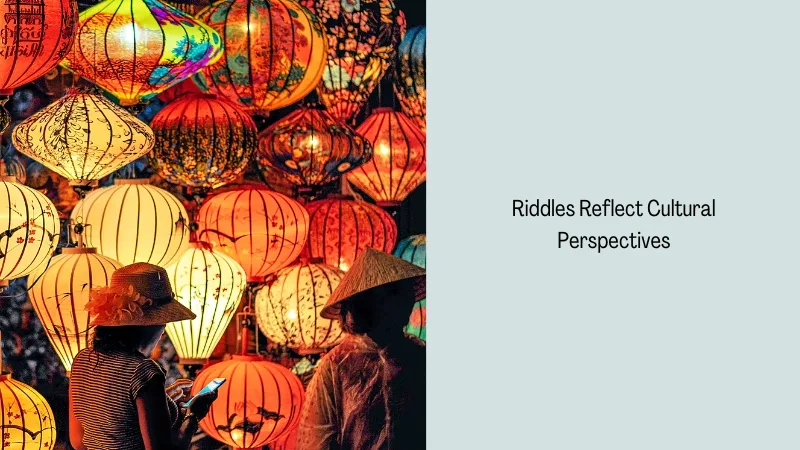
Preserving Folklore and Heritage Through Riddles
In oral cultures throughout Africa and the Middle East, riddles have helped preserve cultural traditions and folklore. Often sung or chanted, these riddles pass down legends, local wisdom, and cultural identity from generation to generation.
For example, humorous riddles told by Ghana’s Ashanti people frequently reference Ananse, a mischievous spider from Ashanti fables. Through vivid imagery and metaphor, Bedouin riddles in Arabic give glimpses of nomadic desert life. In many African societies, riddle games build skills in cleverness and quick thinking, traits prized in communities that rely on wits for survival.
Thus riddles give priceless insight into cultural narratives and customs that might otherwise be lost. Their continued use worldwide is a testament to the human instinct for storytelling, community, and passing wisdom down to future generations.
A Global Community Bound by Riddles
While riddles reveal regional diversity, they also form ties between cultures. In fact, many riddles migrate across borders, getting translated and tweaked for new audiences. For instance, variations of the “river crossing” genre of riddles appear everywhere from Germany to Russia to China. This diffusion shows how we often face similar themes and challenges as humans, no matter where we live.
Riddle appreciation thus brings people together across cultures. In the internet age, a global community of riddle collectors has emerged, sharing their passion online. International riddle societies like the Enigma Society now draw members from over 90 countries. Perhaps this collective joy in solving puzzles transcends cultural barriers because it taps into our universal human nature.
Riddle Traditions Around the World
Every culture brings its own flair to the riddle tradition. Let’s unravel some famous brainteasers and unique riddle customs from across the globe.
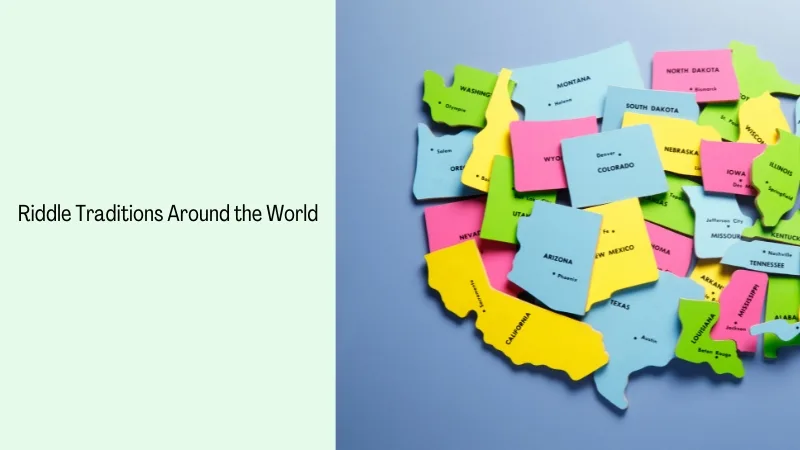
Africa
In many African cultures, riddle games build verbal skills and mentally prepare people for future hardships. During Kenyan riddle contests, participants face off in a battle of wits, exchanging riddles and proverbs to compete without physical contact. West African djali tradition has griots pose rhyming riddles as a way to teach history and share knowledge.
India
Dating back over 2,500 years, Indian poetic philosophy contains some of the world’s most profound riddles. Tales like the Brahmin and the Tiger riddles in Panchatantra animal fables enlighten readers on ethical living through allegory. Vedic scriptures and Upanishads also present riddles that unlock cosmic wisdom.
Japan
In Japan, karinthina riddles joyfully manipulate language by combining two words to form clues. For example, “nemuri-uri” combines the words for “sleep” and “sell” to rhyme and hint at the answer: a sleeping cap seller. This linguistic creativity reflects the Japanese love of wordplay.
Greece
Ancient Greek riddles appear in myths, epics, and writings of philosophers like Aristotle. Riddles showed intelligence, and Greeks valued unraveling them through reason and debate. The sphinx’s impossible question for Oedipus- “What goes on four feet in the morning, two in the afternoon, and three at night?” – is one of the most famous Greek riddles.
Mesoamerica
The Mayans and Aztecs told riddles both in daily life and to convey deeper wisdom. The Mayan Chilam Balam texts use poetic imagery and metaphorical riddles to share prophecies. Aztec riddles also carried moral lessons. For example, “It penetrates the mountains and the personal quarters; it gives people whippings” poetically describes conscience.
Britain
British riddles date from at least Anglo-Saxon times and flourished in the Middle Ages. Wisdom competitions between peasants often included riddles, and medieval monks crafted complex poetic riddles in Latin. Later, nonsense riddles became popular in Victorian England. British authors like J.R.R. Tolkien and C.S. Lewis frequently used riddles in their fantasy works to add mystery.
Around the globe, cultures have crafted riddles that enlighten, entertain, and bring joy. These tricky puzzles reveal regional diversity but ultimately unite humanity through our shared love of imagination, wordplay, and unraveling mysteries. So gather ‘round, sharpen your wits, and try your hand at riddles from across the ages! The delightful challenge awaits.
Frequently Asked Questions About Riddles Across Cultures
What makes a good riddle?
Great riddles create “Aha!” moments with skillful wordplay, metaphor, and double meanings that lead to a sudden insight upon hearing the solution. They balance being challenging to solve but not impossible. A bit of humor helps too!
Why were riddles important in oral cultures?
Riddles developed in cultures with strong oral storytelling traditions as a way to pass down wisdom in a memorable format. The mental effort required to solve riddles helps fix them in people’s minds.
Do riddles really differ across cultures?
Yes, riddles pick up themes and imagery important to a culture’s beliefs and ways of thinking. For instance, Native American riddles frequently reference nature, while ancient Chinese riddles exhibit Taoist principles.
Are numeric and logic puzzles riddles?
Puzzles involving math or abstract reasoning are often considered a separate category. Traditional verbal riddles have imagery, metaphor, or wordplay that requires lateral thinking rather than pure calculation to solve.
What makes riddles fun?
Riddles are fun mental challenges that provide the joy of those “Aha!” moments when the solution clicks. They allow us to playfully show off our wits and cleverness. Shared camaraderie develops around solving riddles together.
Conclusion: Celebrating Global Riddle Traditions
Riddles have connected humanity across oceans and eons through our shared passion for imagination and wordplay. These tricky puzzles entertain while also passing down regional wisdom and identity. Though differences exist, core similarities unite riddles worldwide —they reveal our common humanity. So gather friends, family, or even friendly rivals to share in the adventure of riddles from around the world. Just be prepared for delightful groans and laughs along the way!

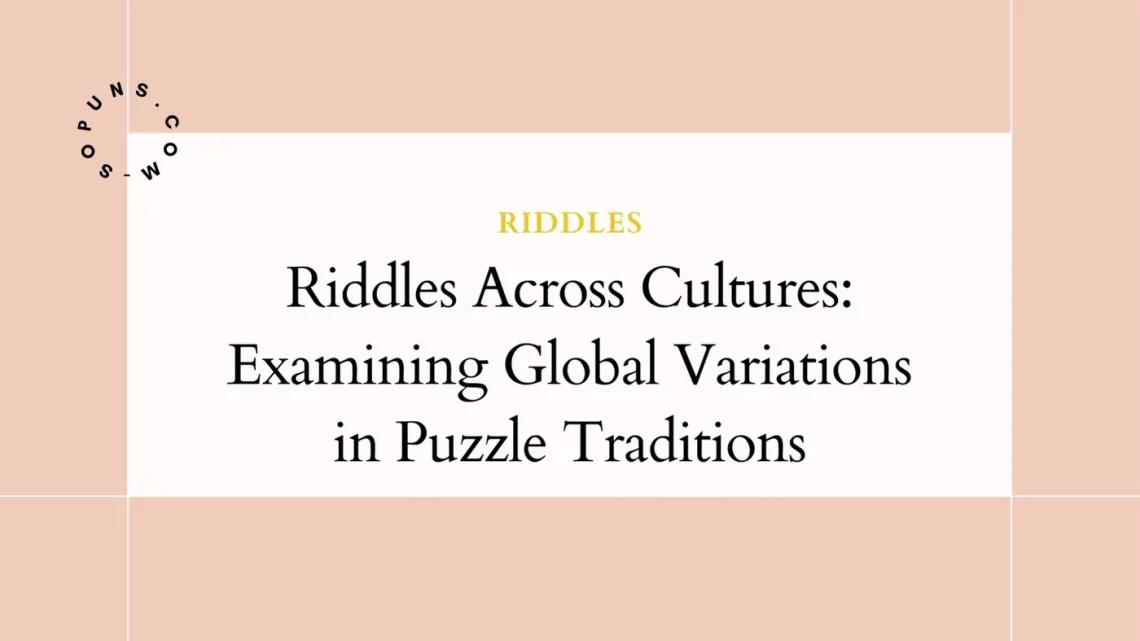


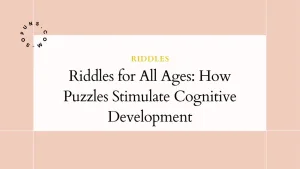
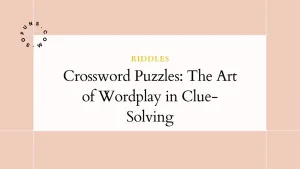
No Comments